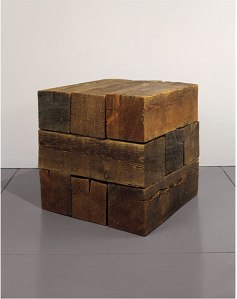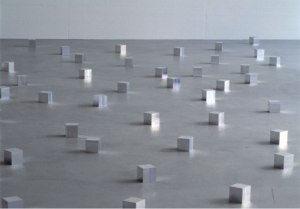Why is intellectualism valued so much more highly in European culture? I’m thinking particularly of French culture, in which characters in novels and films are consistently intellectual types, something rare in American movies where we prefer to glamorize the corporate businessman or the working class.
Life is funny. I jotted down that question a couple of months ago, prompted by a reading of Deep Vellum publishing’s new translation (the first English translation in fact) of French author Anna Garreta’s Sphinx. It’s a short novel with a more interesting conceit, it’s a “genderless” love story (if that doesn’t make sense read the book, it will), than anything else. It’s the curious problem of translation, in a way, (a topic which I will leave for another day,) that I will never really be able to compare the version I’m reading with the original (despite in my case a passable knowledge of French), so its impossible for me to say how much of the writing’s plodding nature was the fault of the translator and what the author, but since I wasn’t reviewing the story, it doesn’t really matter, the book was dull.
But that’s not what this is about, back to my initial question. The protagonist of Sphinx is, what else, a student, an intellectual, which, in a French novel, isn’t at all surprising.
It’s a stereotype, certainly, but one that is born out more often than not, in reality, in large part thanks to the characters we discern in novels, films, etc. The characters in European novels, the canonical ones, don’t shirk from referencing philosophy, waxing on about art and, generally, conversing. Seriously conversing. Constantly. Henry James’ characters, for example, seem to do nothing else.
Try American canonical novels, on the other hand. We write about businessmen and working class laborers, in fact, authors, in my reading of the issue, generally go out of their way to reject the intellectualism of their European contemporaries. John Steinbeck, William Faulkner or more recently, Don DeLillo and Phillip Roth (yes, granted, Roth has university types as characters, but you’d be hard-pressed to find any of them engaged in conversation approaching that of their European peers). I am by no means asserting the inferiority of Steinbeck and Faulkner here, just using their characters and characterization to illustrate a point.
Same goes for movies. Most Americans can’t even get through a piece of new-wave cinema, chock full of characters who talk, talk, talk, incessantly talk, but never actually do anything (See Weekend, 81/2, Scenes from a Marriage, et al.)
We actually like to pride ourselves here in the good ol’ USA on that very thing, our anti-intellectualism (excluding the intellectuals of course) and I can’t say I haven’t taken part in that very backslapping at various times (I like to feel superior in my efficiency as much as the next corporate worker bee), but lately I’ve kind of been wondering what the consequences of this might be for Americans (and, in reality, the younger generations of Europeans since America’s overwhelming export of culture doesn’t appear as though it is going to slow,) this overt display of aversion towards intellectualism.
I’m currently in the middle of reading Allan Bloom’s The Closing of the American Mind. I gather it’s not a universally liked book, unsurprising considering it’s rather unforgiving examination of university campuses, the kids who get there, and the kids who leave, but I found the connection he makes between American political philosophy and the reality of education in America, fascinating, and, I promise, somehow relevant to French vs. American intellectual culture.
I’m heavily, heavily abbreviating here, but here’s the gist. America’s founding fathers based their democracy on two things and two things only, freedom and equality, never questioning whether freedom and equality are right, or at least always right, simply that they are. It made sense, and still does, in a way, that we, in the 18th century, would want to shake off all the trappings of European culture; the American experiment was unprecedented, and, if you think about it, I mean really think about it, it can still blow your mind, how very, very young America is.
Western and Eastern cultures have centuries of history, and more importantly for this conversation, centuries of thought, imparted by tradition, to their respective country’s inhabitants. Reasons for doing what they do, reasons for submitting to a ruler, or for being free. Reasons for societal and familial structure. For having a job. For paying taxes.
What did we have? The response might as well have been/be what else do we need? We have freedom! And we’re all equal! It never occurred to us that we would or could, ever require anything else, without thinking too much about it (which is exactly the problem, here) why would it? We took the usefulness, or importance of the ideas and arguments that uphold a society for granted, as most nations and traditions do. We were going to build our own tradition and we had no concept of the difficulty inherent in such. Think about it, no-one else had ever attempted such a thing.
For a while, we did just fine. We studied the traditions of others, and we experimented with the ideas of English political philosophers such as John Locke and Thomas Hobbes, whose revolutionary (for the time) ideas concerning individual freedom, would take years to fully infiltrate European culture, but could be implemented, without (seeming) consequence, in America.
But, as Alexis de Toqueville presciently noted, tradition, in a democracy, is nothing more than information. So what happens when the information is assailed? Or when the entire world is subsumed with information? We have to have a reason for why information is important, otherwise it is subject to revision. Could it be, that our headstrong desire to differentiate ourselves from our European forefathers would have unforeseen consequences? Our possibly inadvertent failure to create a historical, philosophical rationale and foundation for our system of beliefs, for our freedom and equality, coupled with a too violent rupture with our past, have launched us down a path of moral relativism which, thanks to our overwhelming exportation of culture, would eventually affect the entire western world?
Well we’ve had almost a century’s worth of historical revisionism, at this point, and most of our ‘tradition’ has been discredited, shade thrown on the perceived motivations behind our political foundation and its founders from all sides.
Now we reach the part that’s harder to accept for those of us raised under the aegis of the 21st century and its mantra of equality above all else. The idea here would be that at least before we shook off our political tradition and, forgive me but it’s true, our religious one, here in America, we at least had something we were connected to, something greater than us, our history as a people, a reason for being here, free; the assurance that what we were doing, going to work, starting a family, attending church, was good and right and had meaning.
Bloom argues not that mythology makes life better, but that you must have a reason, a set of reasons, to believe something is true, or right, and without that reason, all hell is perpetually on the brink of breaking lose, (sorry for the lack of a better illustration.) Our sense of purpose flounders.
It’s honestly rather difficult to even proposition our culture with the notion that we are in dire need of a reason, we’ve gone too far down the road of moral and relational relativism, we’ve been using the goal of equality as a reason for being, ignoring our need for something greater, for too long now. We almost no longer need a connection to our past, we certainly don’t feel as though we do, a connection to a tradition of thought and meaning. We feel content floundering, making decisions with no real basis for why one way is right, and one way is wrong. We no longer think to ask how it is that we got here, or what we’re doing here. We’re preoccupied with the present and for our generation, our culture, that’s all there is.
I happened upon a story in the paper this morning about the rise of non-fiction reading in high school English classes. The goal, by common core standards, is to have kids reading 70% nonfiction, to 30% fiction by the time they are graduating, the idea being our fiction is useless in the professional sphere where we will all one day wind up. (And by non-fiction I don’t mean philosophy or criticism, I mean journalistic essays on teen suicide rates and PTSD amongst military veterans and the like).
So what are the consequences of the increasing push towards an outright elimination of any inkling there may be value in reason, argument and slow, deliberate thought? What do we lose when we don’t value the intellectual, the philosophical? Does it matter that we no longer know why we do or don’t believe anything? Is this just another step in man’s evolution? An inevitable step? Is efficiency the end goal of man’s life?
I realize as I’m ending this I haven’t reached any sort of conclusion. I also realize that I believe strongly that not only is our ignorance of cultural and intellectual tradition frightening and that it will have consequences on our future, I’m at a loss as to how to convey the importance of such. Bloom argues in his book that early exposure to, specifically beauty in the form of art and music, is key to a sense of curiosity and a desire to know, in which case, for many of us, all of us really, it’s too late.
There are certainly many actively arguing for a reevaluation of cultural tradition, as a necessity for cultural stability, but they’ve yet to make an argument strong enough to incite change. And it seems to me as if Europe is slowly adapting to American values rather than vice versa.
And so it, at least in my experience, requires some more digging. We don’t know why we believe or often what we believe anymore, it’s not whether that matters, and it’s not why that might be, it’s how it affects society as a whole.









